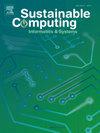用于 WSN 网络安全通信的基于模糊技术的高能效 Rider Remora 路由协议
IF 3.8
3区 计算机科学
Q1 COMPUTER SCIENCE, HARDWARE & ARCHITECTURE
引用次数: 0
摘要
由于 WSN 的资源限制特性,确保 WSN 通信安全是一个具有挑战性的问题。此外,提高网络寿命也是现有研究面临的主要问题之一。因此,为了确保 WSN 之间的通信安全并提高网络寿命,本研究提出了一种新型的信任路由协议。首先,使用直接、间接和总信任评估构建簇,这有助于识别故障节点。然后,使用基于改进模糊平衡成本的簇头选择(IFBECS)方法来选择簇头(CH)。最后,为了确定从源到目的地的最佳路径,引入了一种混合仿生节能路由模型,即节能骑乘者路由(ERRR)协议。为了提高网络寿命和吞吐量,该协议考虑了 CH 的剩余能量、传感器节点空间、CH 等参数。所提出的机制是在 NS-2 编程工具中实现的。仿真结果表明,所提出的路由协议在 50 ms 的时间周期内提高了 PDR 97.92 %,在 100 ms 的时间周期内降低了能耗 3.336,在 250 ms 的时间周期内提高了吞吐量 86262.7,在 200 个节点中提高了网络寿命 1028.08 轮。因此,与其他现有协议相比,所提出的路由协议取得了更好的结果,清楚地表明它非常适用于安全节能的 WSN 通信。本文章由计算机程序翻译,如有差异,请以英文原文为准。
Fuzzy based Energy Efficient Rider Remora Routing protocol for secured communication in WSN network
Due to the resource constraint nature of WSN, ensuring secured communication in WSN is a challenging problem. Moreover, enhancing the network lifetime is one of the major issues faced by the existing studies. So, in order to secure the communication between WSNs and achieve improved network lifetime, a novel trust enabled routing protocol is proposed in this study. Initially, the clusters are constructed using Direct, Indirect, and Total Trust evaluations, which helps to identify the faulty nodes. After, an Improved Fuzzy-based Balanced Cost Cluster Head Selection (IFBECS) method is used to choose the cluster head (CH). Finally, to determine the best path from source to destination, a hybrid bionic energy-efficient routing model known as an Energy Efficient Rider Remora Routing (EERRR) protocol is introduced. To improve the network lifetime and throughput, the parameters like remaining energy of the CH, sensor node space, CH, etc., are considered by the utilized protocol. The proposed mechanism is implemented in NS-2 programming tool. The simulation results show that the proposed routing protocol has attained improved PDR of 97.92 % at the time period of 50 ms, reduced energy consumption of 3.336 at the time period of 100 ms, higher throughput of 86262.7 at the time period of 250 ms, and enhanced network lifetime of 1028.08 rounds in 200 nodes. Therefore, by attaining better results as compared with other existing protocols, it is clearly revealed that the proposed routing protocol is highly suitable for secured energy efficient WSN communication.
求助全文
通过发布文献求助,成功后即可免费获取论文全文。
去求助
来源期刊

Sustainable Computing-Informatics & Systems
COMPUTER SCIENCE, HARDWARE & ARCHITECTUREC-COMPUTER SCIENCE, INFORMATION SYSTEMS
CiteScore
10.70
自引率
4.40%
发文量
142
期刊介绍:
Sustainable computing is a rapidly expanding research area spanning the fields of computer science and engineering, electrical engineering as well as other engineering disciplines. The aim of Sustainable Computing: Informatics and Systems (SUSCOM) is to publish the myriad research findings related to energy-aware and thermal-aware management of computing resource. Equally important is a spectrum of related research issues such as applications of computing that can have ecological and societal impacts. SUSCOM publishes original and timely research papers and survey articles in current areas of power, energy, temperature, and environment related research areas of current importance to readers. SUSCOM has an editorial board comprising prominent researchers from around the world and selects competitively evaluated peer-reviewed papers.
 求助内容:
求助内容: 应助结果提醒方式:
应助结果提醒方式:


